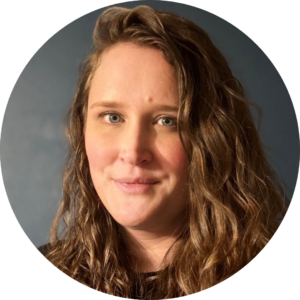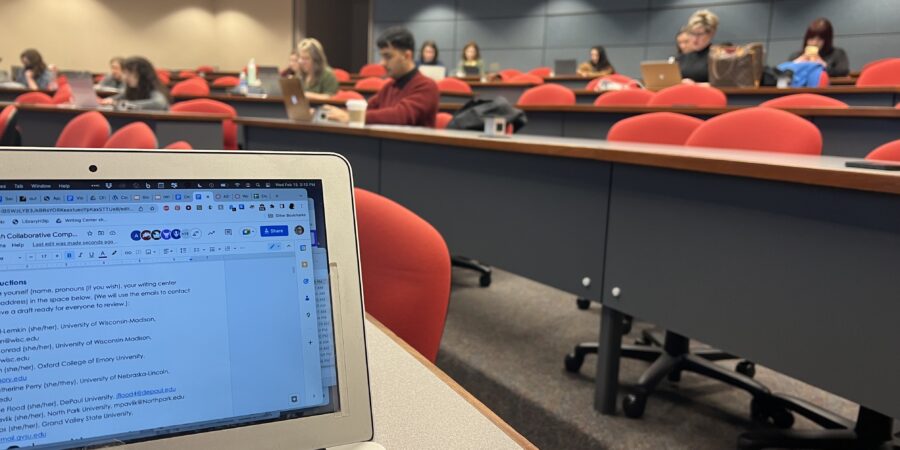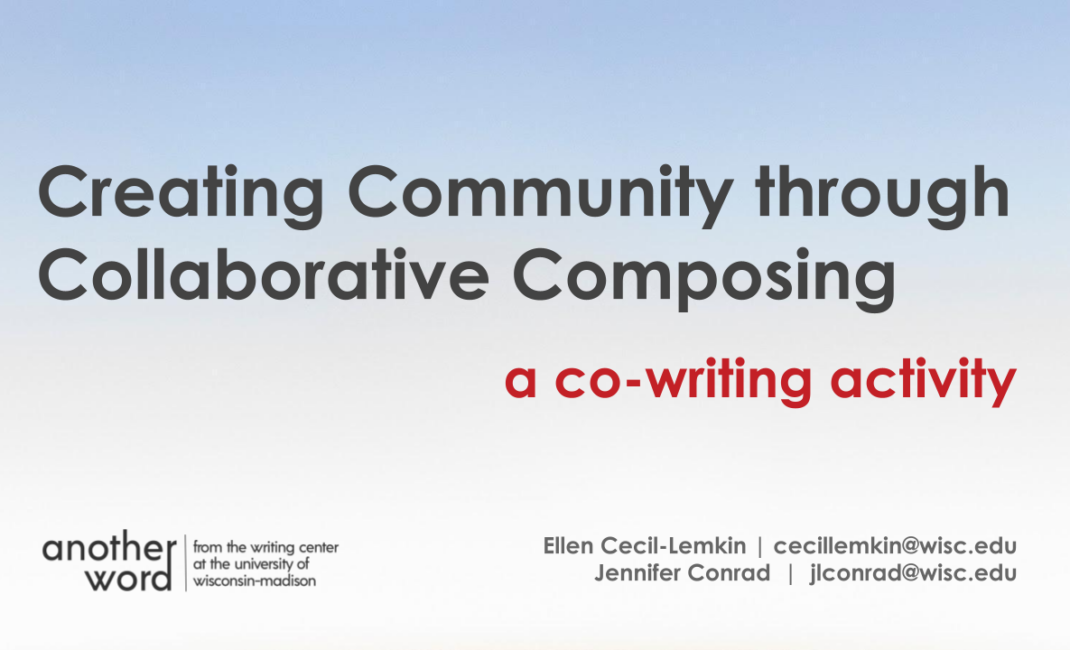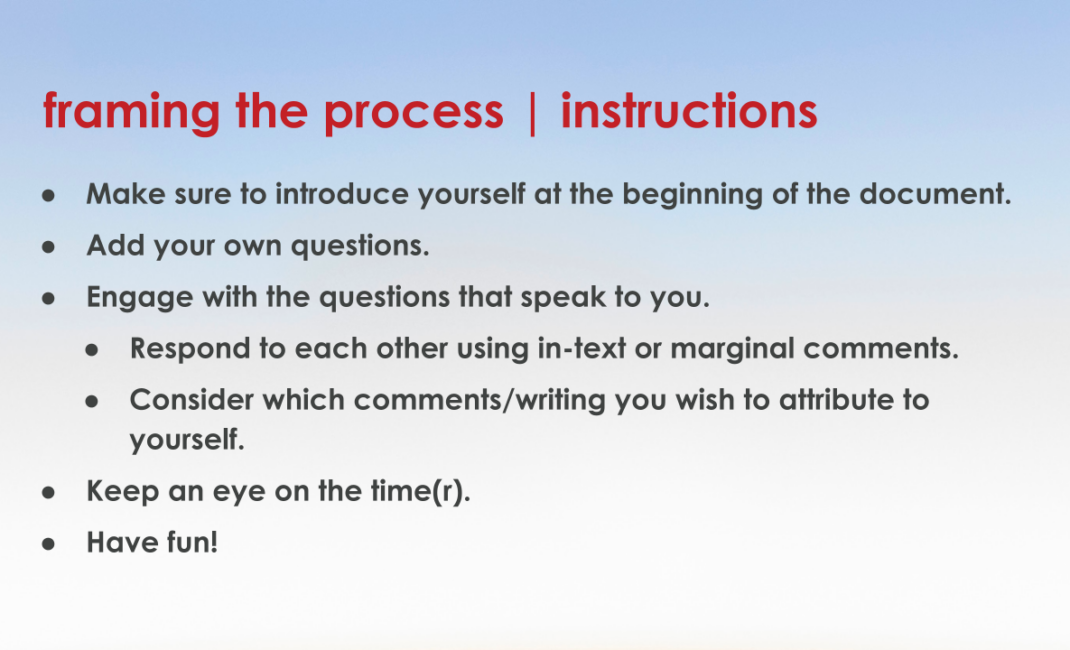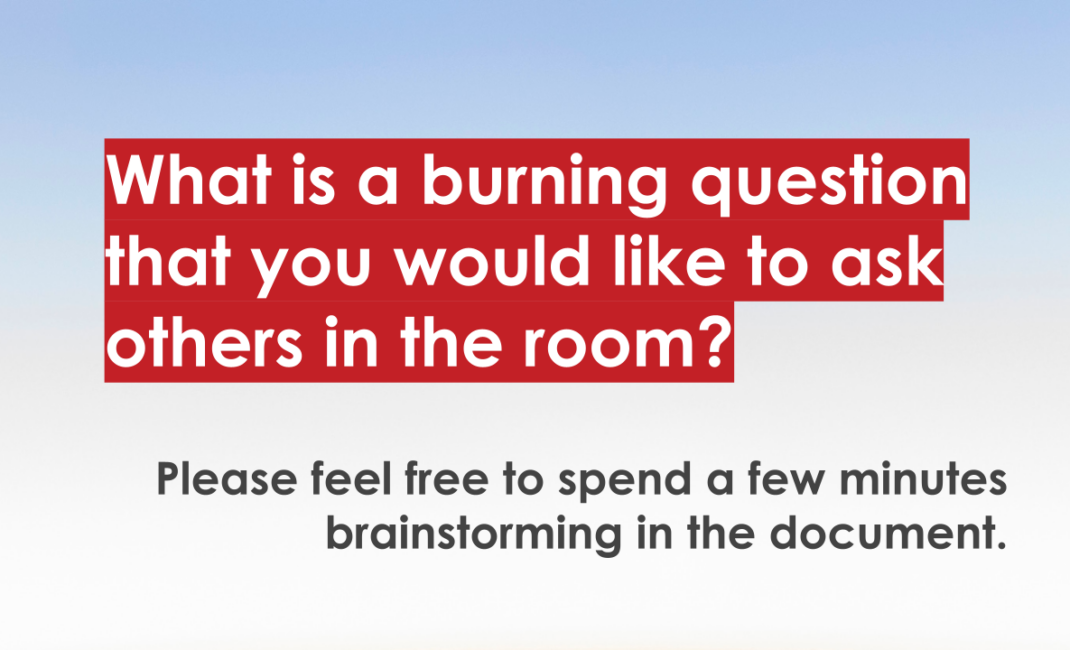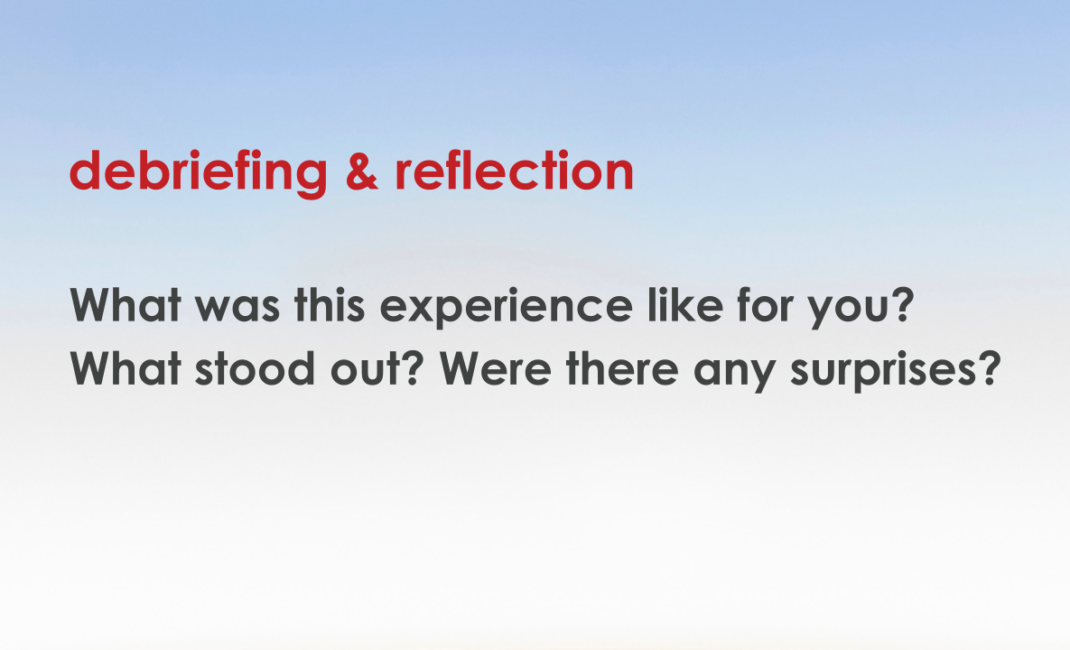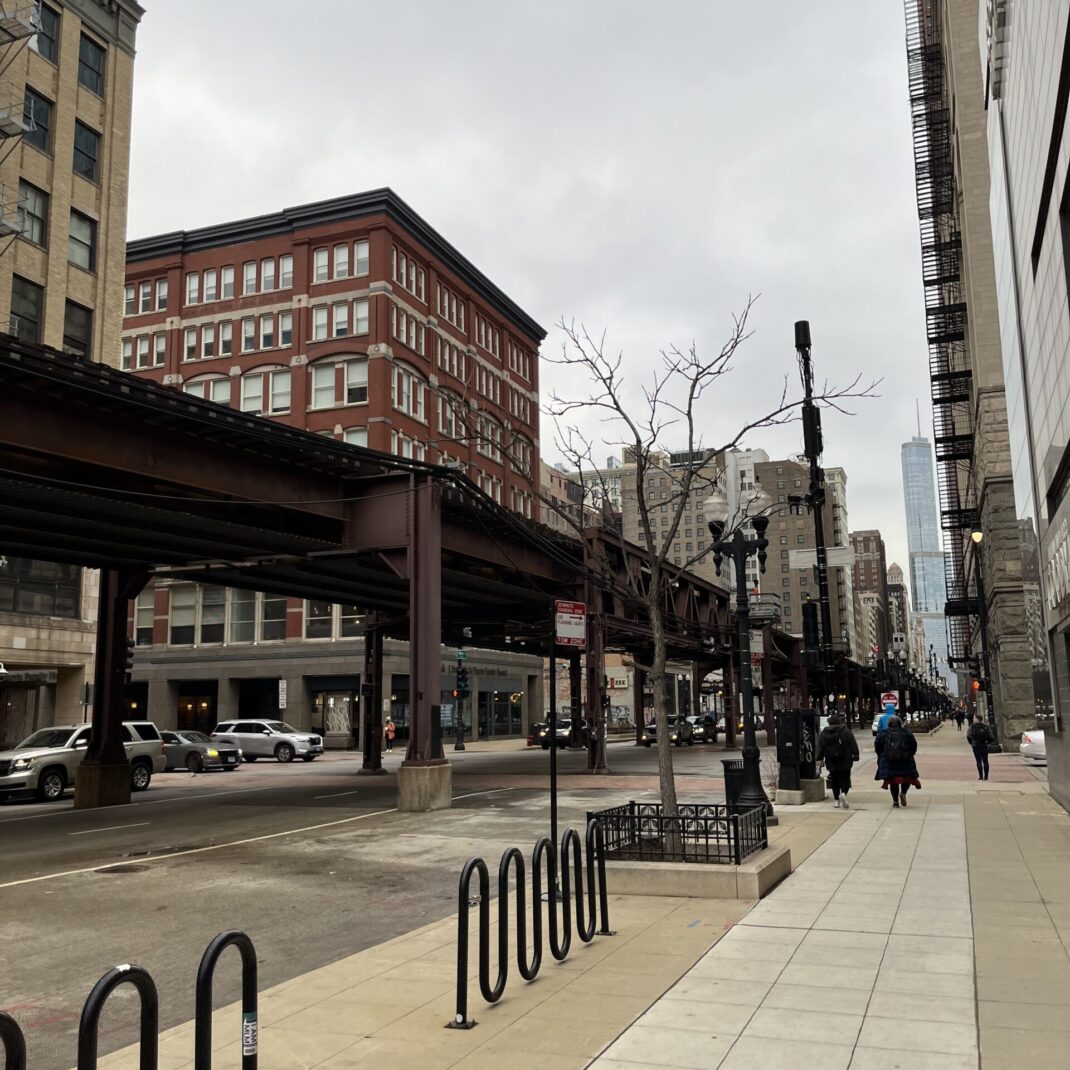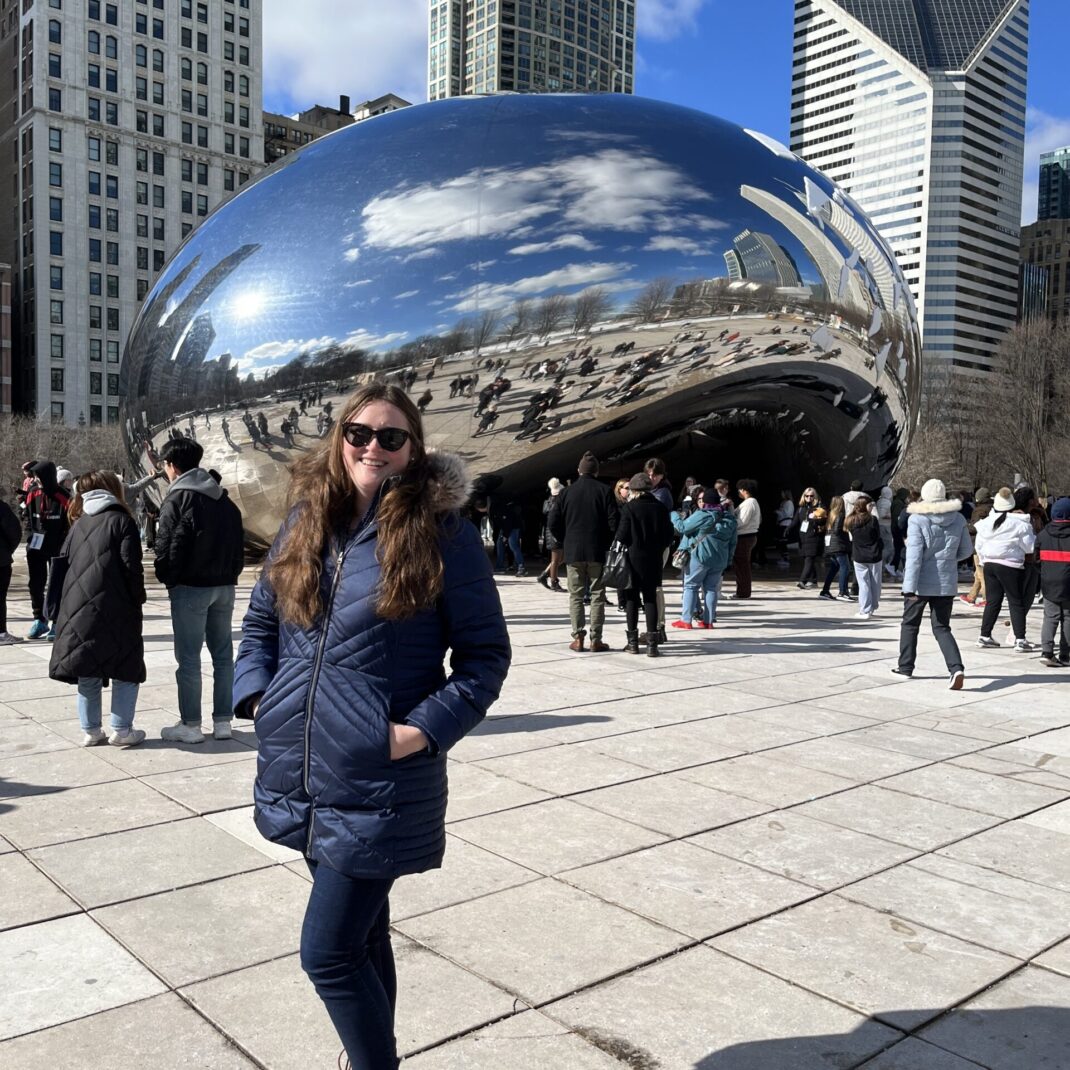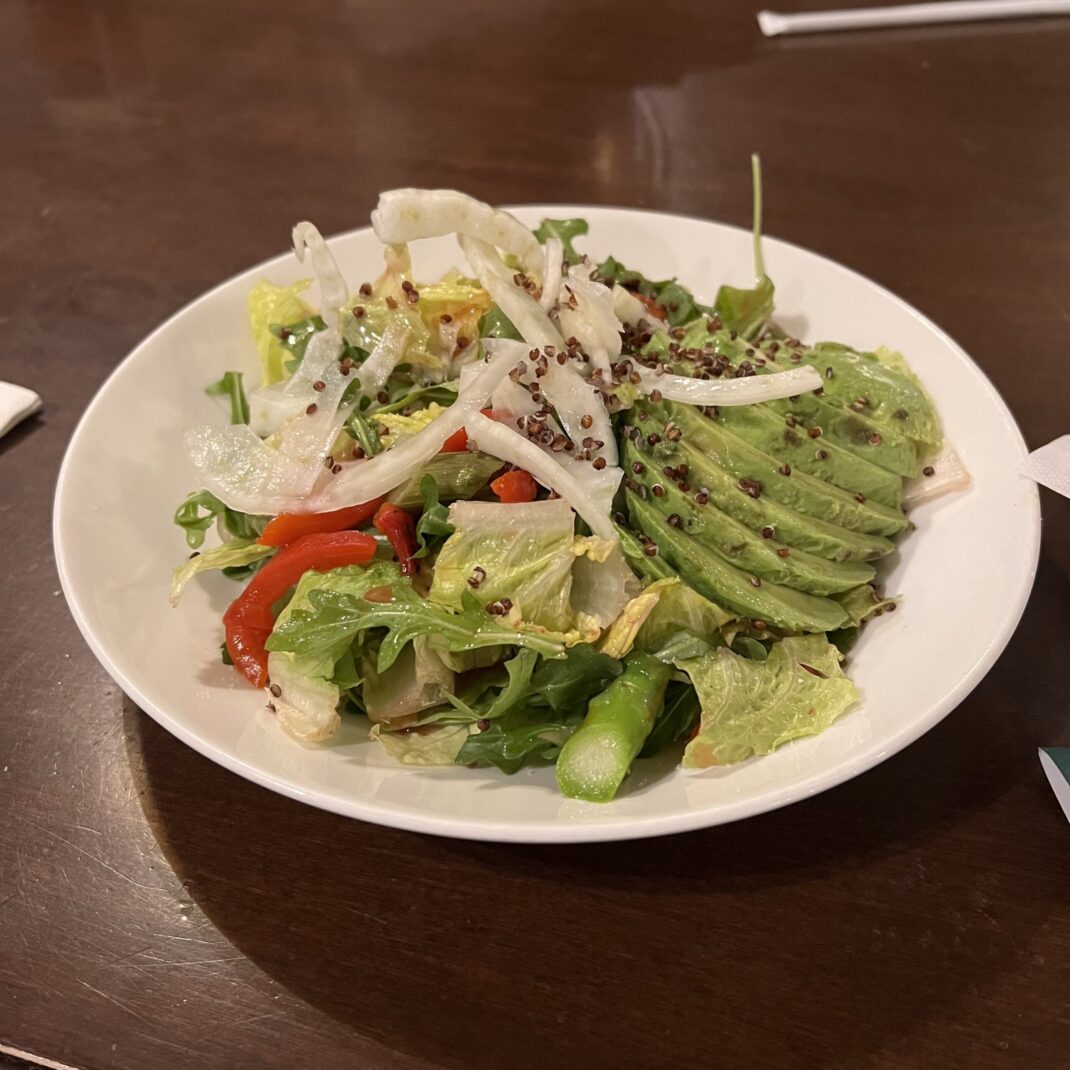Introduction by Jennifer Conrad and Ellen Cecil-Lemkin
The 2023 IWCA Collaborative took place in Chicago on Wednesday, February 15 and marked our first return to in-person conferencing since 2019, the year prior to the onset of the COVID-19 pandemic. The original call for proposals centered on a consideration of “writing center relationships, partnerships, and coalitions,” as well as the benefits of shared embodied presence with colleagues across the field of writing center studies.
For us, there was a special energy about returning to a shared physical space, getting to see friends in person for the first time in years, and having the opportunity to meet new colleagues. While virtual conferences offer collective digital spaces for sharing research and connecting across disparate geographies, we’ve found that these spaces supplant rather than fully supersede the experience of “inhabit[ing] a place together.”
Our session, which was titled “Creating Community through Collaborative Composing” (we like alliteration and the play on 4Cs) provided an in-person-slash-online space in which participants were invited to engage with us and, more importantly, with each other around their experiences with writing center work. Specifically, we invited them to engage in a collaborative writing session—or “co-interview”—that unfolded in real time on a shared writing platform.
Through a series of questions, we asked participants to consider what it feels like to carry out writing center work in our unique, embodied, historical moment. We also gave participants the opportunity to respond to comments and ask questions of each other. During a scheduled break, participants read over the answers, then provided additional responses, elaborations, and/or questions. By the end of the session, we created a written snapshot of those engaged in writing center work at a particular moment in time.
What did it feel like to be in a room together? It felt, in short, incredible—incredible in the sense that we almost couldn’t believe that it was occurring, and incredible in the sense of amazing. There was a feeling of warmth as participants engaged with each other in the space of the room and in the space of the document. Having the chance to focus on our own writing (and emotions) felt like a welcome or a big hug, since much writing center work involves holding space for others’ writing.
The session worked against the isolation of the pandemic by allowing us to feel community in tangible ways—Through writing! Through being with each other!—so that we left the conference feeling energized and ready to share our collective thoughts with an audience. Our intention was to publish this piece within three months of the Collaborative. Yet life and the Writing Center’s myriad, multitudinous tasks intervened. And so we find ourselves, a year later, still waiting for the community that we created through our session to be shared.
We know, however, that we are not alone in laying out plans that are later run aground by the pushes and pulls of writing center work. While many of our participants shared their centers’ successes, there was also an acknowledgement of the challenges that left an affective mark. Indeed, one of our favorite participant-generated questions asked the group, “How tired are you?” The responses to this question and others showed that while we take great pride in our work, we’re also incredibly fatigued. Emblematic of this sentiment was Leigh’s response: “Honestly, I am so burnt out that I desperately would like to rotate out for a bit.” Feelings of exhaustion and burnout are seldom shared in a professional context, so these raw expressions feel particularly precious.
The participants’ often vulnerable responses and our personal experiences conferencing point to a shift. One participant remarked, “It’s hard to make a distinction between ‘change is cyclical’ and ‘this change is not the normal kind of change.’ It’s walking a tightrope to acknowledge and commend our ability to evolve without disregarding the trauma of this new world we occupy [after COVID-19].”
Although we (the collective) can feel pressured to return to “normalcy” or “the before times,” the fact is, life has shifted. The accounting of emotional weight feels different. Coming together at the IWCA Collaborative allowed us not only to name these changes but to describe them and begin tracing out the ways that we were all affected by the rapid shifts of that present and sent spinning by the twin forces of contagion and isolation that drove the years 2020-23.
Even with the changes, rawness, and exhaustion everyone experienced, our participants also shared their joy. They wrote of their hopes and dreams for their writing centers, their pride in their work, and the valuable insight they had gained. Their writing demonstrated a collective desire to positively impact people through their writing center. It seems a uniting thread for writing center professionals is a shared commitment and delight in uplifting writers, tutors, and colleagues through our work.
In the remainder of this post, we are excited to share with you some selected questions and responses from our co-interview session. In this post, you can find participants’ responses to the following questions:
- What has changed in your writing center since COVID-19?
- What about your work makes you the most proud?
- What is the most valuable thing you learned in the past five years?
- Who do you identify as the most genuine collaborators at your institution?
- Where do you find yourself coming into conflict with stakeholders at your institution?
- How tired are you?
- How are you advocating for equitable working conditions?
- What’s one piece of advice for someone considering a career in writing centers?
- What is your dream for your writing center in the next five years?
When reading the responses, you’ll notice that some participants chose to identify themselves, while others elected to remain anonymous. We honored the authors’ preferences in how they wished to be identified in connection to their writing.
By publishing this composition, we intend to create an archive connected with the resumption of in-person conferencing and a return to in-person writing center instruction. We also imagine that the knowledge shared during the session will offer some productive insights for writing center professionals and those hoping to join the community. Most of all, we hope that these responses remind our readers that they are not alone in their experiences, successes, and challenges.
Contributors
- Saurabh Anand (he/his), University of Georgia
- Leah Bowshier (she/her), University of Arizona
- Ellen Cecil-Lemkin (she/her), University of Wisconsin-Madison
- Jennifer Conrad (she/her), University of Wisconsin-Madison
- Leigh Elion (she/her), Oxford College of Emory University
- Tabitha Fisher, M.A. (she/her), Penn State, University Park
- Jacqueline Flood (she/her), DePaul University
- Rachel Herzl-Betz (she/her), Nevada State University
- Dr. Jennifer Mayes (she/her), Walters State Community College
- Emma Catherine Perry (she/they), University of Idaho
- Melissa Pavlik (she/her), North Park University
- Amy Phillips (she/her), Grand Valley State University
- Sherry Wynn Perdue (she/her), Oakland University
- Maggie Rothrock (she/her), DePaul University
- Angela Zito (she/her), Albion College
What has changed in your writing center since COVID-19?
- Leigh: Even at a residential SLAC, we incorporated on-demand online instruction for sake of accessibility for both writers and tutors; unpredictable engagement from both writers and tutors/constant re-assessing of our outreach needs; lots of talk from tutors (and their director) about building community, but the willingness to do the lift for active community building is spotty; more willingness from both the director and tutors to assert boundaries around work and ask for assistance; a bigger social media push that’s not necessarily tied just to the pandemic but is related to doubling down on outreach; more faculty on campus are willing to incorporate or talk about writing in their classes (hooray!), possibly because of early pandemic conversations about shift pedagogy in more equitable directions (eg less timed testing)
- Sherry: I am trying to be a good role model in [asserting boundaries]. I struggle with mindfulness and self care. Historically, I’d be described as type A with a heart. But, I cannot do it anymore and I don’t want them to be proud of ignoring their own needs, etc. I can only do this by living the values I preach.
- What hasn’t? Our whole consultant staff has turned over. Some of our consultants have never been present in the same room. In fact, I’ve never actually been in the same room with three of them. Many of our international graduate writers were called home and never returned. These were regulars with whom we had formed genuine relationships. Because of Google restrictions, we are not even able to contact some of them to check in. Are they still alive? Will they be able to complete their programs here or elsewhere? The easy banter that used to fill our space, the collaboration that used to happen behind the reception desk, in the break room, and at consulting tables is, well, less easy. I/we(?) feel a deep sense of loss, but I also don’t want to recall the mythical good old days Before-Covid. We–the consultants and the leadership team–are in a time of renegotiation and change. It’s uncomfortable. I liked how things were.
- Tabitha: It’s hard to make a distinction between “change is cyclical” and “this change is not the normal kind of change.” It’s walking a tightrope to acknowledge and commend our ability to evolve without disregarding the trauma of this new world we occupy.
- Sherry: Here I see something that I was trying to articulate. Change is natural and good. But we are talking about massive change across a brief timespan. It’s as if we/I cannot catch our/my breath.
- The length of our writing appointments; the way that students sign up for same-day writing appointments (online rather than using a physical sign-up sheet); the modality for our monthly staff meetings, which are now virtual rather than in person; the ratio of in-person to online (virtual) services
- DPU writing center faculty and peer tutors have contributed to the development of our online real-time appointment procedures. Writers seem to prefer Zoom over the portal we use associated with our client-tutor communication platform, and we have been brainstorming ways to improve writer’s experiences during online appointments as this mode of communication has been popularized.
- Graduate student demand/interest has increased, outpacing undergrad student demand/interest–no idea if related to Covid.
- We have fewer students on campus in general. Because enrollment is down, our traffic is down. We have not resumed in-person workshops yet, but on the positive side, we are now working on an online Writing Center – something we have long needed.
- The proliferation of online options has largely replaced satellite locations. Our center used to meet in person with students in up to seven different physical places, but now our appointments are centralized in one location. Students always have the option to join an appointment online. We do have a few drop-in sessions that we do to maintain relationships with some of our campus partners, but we don’t have formal satellite locations anymore.
- Our writing center (out of necessity) finally learned how to do virtual online tutoring! Before the pandemic, we had had a manual and were tutoring a handful of graduate/School of Professional/commuter students virtually, but nothing was standardized and many tutors and administrators (including myself) seemed wary of how to navigate virtual tutoring. Now we offer virtual and in-person tutoring and have incorporated virtual tutoring into our tutor training class and Writing Advisor handbook.
- Saurabh: So many things have changed for good and for good reasons. Our writing center director and my peer consultants learned that “no does not mean never.” Self-care is not a “good-to-have” but a “must-have” thing. We have become part of each other’s lives like characters in Sci-Fi novels where every character is bespoke, crafted to beat the apocalypse. In our case: “intellectual apocalypse,” every tiny step in our position matters, in our little tutoring tacts, or by seeking help when one’s emotional weather is not right or could be better. For me, it is critical [to have] empathy in the writing center space in everyday life, where everyone likes to intentionally have a back for each other.
What about your work makes you the most proud?
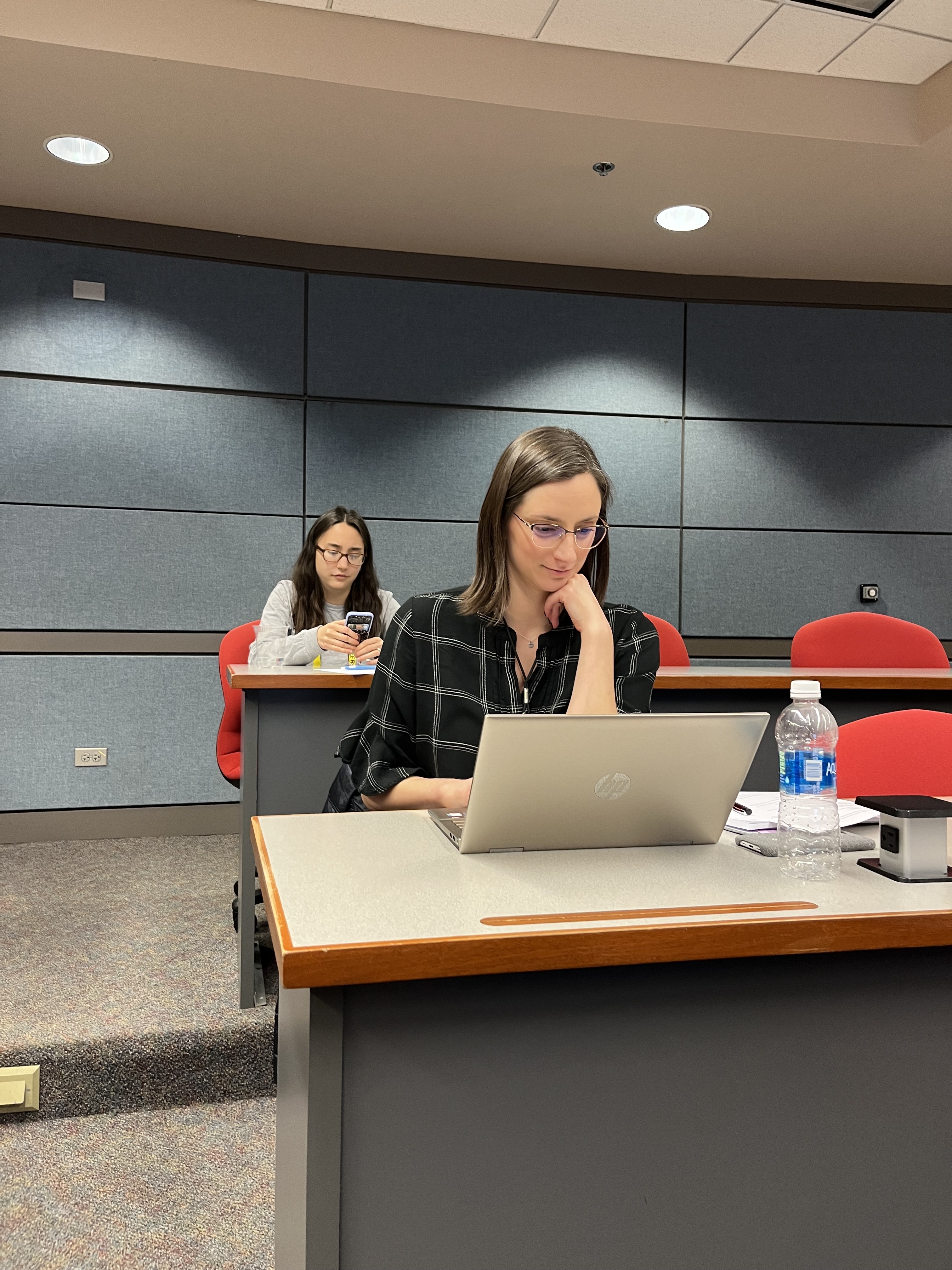
- I think my staff feels supported. They know they can come to me with anything and I will do my best to help them.
- Ellen: The work that makes me the most proud is my work around accessibility for disabled students — both tutors and tutees. I am so proud of the meaningful change that I can make for these students. Many of them feel unseen and unsupported by their departments, professors, or advisors. As a disabled individual who’s graduated from a PhD program and is now working as a writing center admin, I can offer support, perspective, and a community for other disabled individuals. I’m making small, but meaningful change and that keeps me going.
- Rachel: Same, Ellen. A tutor in my center recently shared that she felt supported in our center and like she “wasn’t a burden.” Her embodiment is simply part of the whole self she brings to the space, and I was simultaneously grateful and angry that she doesn’t get to feel that everywhere.
- Leigh: Same, Ellen and Rachel. I’m proud of my advocacy for student writers and especially for tutors’ working and learning conditions. Also, I inherited a writing center that hadn’t had stable leadership in decades and was highly stigmatized on campus, and I’m proud of the respect faculty and students now have for the writing center, as well as the ways I see them changing how they talk about writing processes and the role of writing in the world.
- Saurabh: As an ESL teacher, in my tutor and assistant director positions, I get to continue serving my students’ success by offering them the ladder of guidance, bridging where they are and where they want to be, and vice versa.
- Our WC is just a cool place with cool people. I am proud of the atmosphere and welcoming vibe.
- Amy: To instantly grasp and assess a piece of writing is, essentially, Jeopardy on crack. It’s like answering “Sliced apples sautéed in butter are a classic filling for these French pancakes” (my first Google result for “Jeopardy questions”) with “crepes,” then continuing to parse out the kinds of apples, the length of the sautéing process, if there are alternatives to butter, who first made these pancakes and what the historical and perhaps socioeconomic conditions surrounding their creation and current use tell us about French society today. What am I proud of? That I can do all of this in a half hour session and alight the gas flame of the student’s stovetop. When the magic happens, the deliciousness is, well, beyond words.
- Angela: I’m most proud of those moments when, talking with tutors about how to navigate an unexpectedly tricky session (e.g., “My student just shared that they used ChatGPT to write their grad school application essay—what do I do??”), they arrive at strategies/ways forward themselves with only a question or two to prompt them… remembering that asking open-ended questions, showing interest and valuing the student as a whole person, acknowledging how hard writing is… All these things recentering their practice around learning and growth and awareness.
- Rachel: I love this focus. In my current role, it’s so easy to get directive and to forget everything I’m missing by letting them work things through on their own.
What is the most valuable thing you learned in the past five years?
- Student workers are just as important to support as the student writers who make appointments. The center’s health is not dictated by its ability to serve others alone, nor by its utility to the institution; it also needs to cultivate an identity as a functional, fun work environment.
- Sherry: Amen! We need to remind upper admin that when we talk about student support we are talking about student employees.
- Ellen: Ugh, there’s so many things that I’ve learned that it’s hard to boil down to just one! I’d say that networking is a really important skill that I’ve learned. Networking is the fancy way of saying (for me) talking with and building relationships with other professionals. I used to be really intimidated by the process and worried that I’d look like an impostor. But, I started approaching it with just genuine curiosity about other people and their experiences. It’s led to a lot of great conversations, collaboration, knowledge sharing, and publications.
- Jenny: Yes, so many things! Five years ago, I did not yet know that I’d be doing this work. I didn’t know that we’d all find ourselves in a global pandemic and have to make such radical shifts to teaching in a short period. I’m always learning, but I feel like I’ve learned the importance of responsiveness (to conditions, to others, etc.), which feels different from reacting. What do I mean? For me, responsiveness is more of a balanced approach: a shift into a new place rather than trying to keep from falling down. Of course it’s easy to feel the falling-downness of it all at a time when much in our usual approach has radically shifted–but at the best of times, I’m aware of the affordances of quick change, and the way that even lumbering institutions (should I say that?) can develop a kind of nimbleness when needed.
- A big thing for me over the last few years is trying to figure out how to manage the day-to-day admin work, pursue campus partnerships and other projects, support our tutors, defend our work to upper administrators, and respond to student needs while dealing with limited resources and trying not to get burnt out. It’s something I am still struggling with, but I see it as crucial to thinking about how to make this work sustainable since I see myself as doing this for the rest of my career. I am seeking a better balance and trying to make the work more manageable for what the resources and labor available.
- Rachel: I don’t know about “learned,” but maybe “learning”? I’ve started learning how to set the work to the side and let it not be the largest part of my identity. Maybe it was age or family changes, but I’ve gotten better at finding spaces and contexts where success on the job isn’t the first way that I can be useful, valuable, or worthy of taking up space.
- Something crucial to my success and my ability to create meaningful relationships and facilitate worthwhile interactions with writers is to accept that I don’t know all the answers. I truly try to maintain and be transparent about the peer-to-peer plane we operate on in writing centers. I find that I learn just as much from the writers that come in as I share my experience and strategies with them. If I do not immediately have the answer to a question a writer presents, we undertake the researching process together in a way which is beneficial to the drafting and editing process.
- Leigh: All of it? I became a new director in Fall 2019, 6 months before the pandemic hit, in a center whose model is very different from the one I trained in as a graduate student. Among a great many things (like how to educate tutors, how to build anti-racism and equity into the fabric of the WC, how to talk about the writing center to students and faculty in my specific institutional context, how to build and lean on a network of colleagues and mentors), probably the best thing I’ve learned is a piece of wisdom passed on to me by Georganne Nordstrom: if you ask someone to fold the laundry, and you don’t like the way they fold the laundry, you can’t refold the laundry yourself. In other words, I’m learning all the time about what details to care about and where to relinquish control.
- Tabitha: I’ve learned that I don’t have to solve every problem. This principle looks different depending on the circumstance, but often it means, for me, that I don’t have to have a solution ready in hand for any trouble that comes our way. We preach, often, that it is not up to the writing tutor to have the perfect suggestion for a writer’s difficulties; in fact, it’s often best that, if they think they do have a perfect suggestion, they hold their tongue for a moment and let the writer think. I’m learning to hold my tongue more and let my tutors show me that they are good at solving their own problems or, at the very least, that we should solve them together.
Who do you identify as the most genuine intra-campus collaborators at your institution and why?
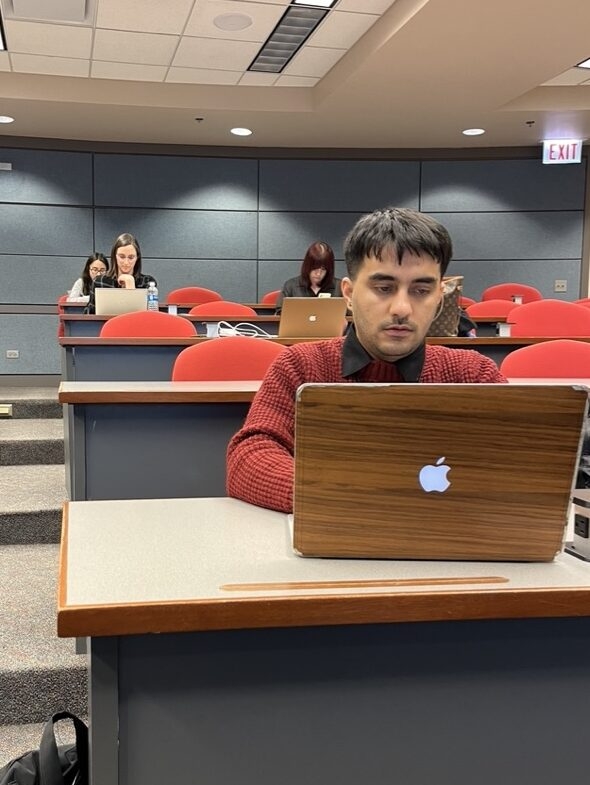
- Leigh: the Math Center (because the director’s faculty appointment structure is most similar to mine); the librarians (because they want the WC to pick up on helping students operationalize the information literacy skills they teach); the director of the Milestone e-portfolio program (because students have a lot of text-based writing to do for this required portfolio but also because he and I are seen as the two multimodal communication specialists on campus); faculty who teach Continuing Writing (upper division) courses, especially the Biology faculty (because my college is only first and second year students, they often perceive Biology writing to be very different disciplinarily from the other writing they’ve done so far); Campus Life staff (when it comes to planning student events and workshops); Counseling and Career Services (because, as one of my former tutors put it, the Writing Center is also a Feelings Center)
- My Writing Center is located within our Learning Center and, while there are various benefits and drawbacks to this approach, I’m glad to work with a team of people who care so much about student support. Sometimes I think that their feedback is even more helpful because we’re not in the same subject area, like having someone outside of your discipline give reader-response to your writing. My director is a strong advocate for our needs.
- Can I ask when your director has really needed to step up for you? When did you know they had your back?
- We have been going through a budget cut, and I’ve been stuck in a difficult situation in making decisions on where those cuts will be. My director (not WC director, LC director) has been very kind to me in redirecting much of the backlash we’ve received from departments towards him. He’s also been available to talk through and brainstorm strategies for some very sensitive issues. He also worked, along with my other staff, to step up and supervise the center right after my mom died suddenly last year.
- Composition program/faculty, graduate students, libraries, student support services (particularly career center, first-gen services, transfer services, veteran services, etc.)
- We mainly collaborate with the Graduate Center, Library, Writing Across the Curriculum, Writing Program (foundations writing), and General Education programs. We are also part of a larger student support unit, so we partner with subject tutoring, academic skills support, supplemental instructions, and others at times.
- Our collaboration with the disability resource office has been a tremendous development over the last several years. They’ve partnered with us on developing workshops and writing groups, as well as referring interested students to the Writing Center directly for one-on-one sessions. Lots of reciprocal learning and educating across our centers, too, helping staff in both places be more aware of what the other does and how to connect students across the programs.
Where do you find yourself coming into conflict with faculty or staff members at your institution? What relationships are tricky right now?
- Not conflict per se, but relationships with some partners at the libraries have been tricky due (in part) to staff turnover on both ends. Common goals and values are still there, but communication is more difficult when a good deal of institutional memory is lost with a colleague who’s left for another opportunity.
- Melissa: Agree! Relationships at my institution have been tricky with librarians due to staff turnover and lost institutional memory…
- Right now, the faculty in our new graduate programs aren’t comfortable with undergraduate peer tutors supporting their students, but our limited number of graduate programs are too small and brief to support many graduate tutors. I know that with the right training our team can support their students, but I’m still navigating faculty buy-in (as well as my own frustration).
- Our university currently has a writing center and a few minimal peer tutoring options in other subjects (and SI: Supplemental Instruction for many STEM classes, provided by undergraduate SI tutors), but we don’t yet have anything close to an academic support center/robust advising/student services/mentoring through Student Engagement. The conflict at hand seems to be that the Student Engagement admin want an academic support center and want the writing center to be under them at the same time as they want to use the institutional history/best practices of the writing center we’ve had for 20 years as a springboard to develop an academic support center.
- There is much conflict on our campus about who is responsible for writing placement and academic advising/registration for 1st year students. We have a First-Year Seminar Director and a Writing Center Director (me), but neither one of us has access to advising/registration info. First year students are constantly misplaced (put into the developmental writing class for no credit when they should be in the credit-bearing course or vice-versa), and no one seems to be quite sure of how to identify these misplacements until semesters have already begun.
- The trickiest relationship is with my WPA colleague with whom I don’t see eye to eye about a great many things. The librarians also want to have more of a partnership than I do. In theory, that should work well, but there has been lots of turnover in librarians and a leadership vacuum at the top, and their teaching offerings don’t reflect the values I’d like the Writing Center to prioritize.
- We have a general tutoring center, and that relationship is awkward. They do not want to refer to us for fear that it makes them look like they cannot handle it, but writing should be sent our way because that is what we do. This relationship has always been a bit strange, but I wish we could be less competitive and collaborative.
- We had that same situation until recently. Another director on my campus initiated monthly meetings and those helped us clear the air (and establish all the places where we truly were not in competition). Issues crop up, to be sure, but there’s a better foundation of trust.
- Sherry: So discouraging, but today Grand Valley State University (in Michigan) shared how four different units in three different colleges/departments collaborate to meet student needs, sometimes by co-consulting during the same session.
- There has been no outright confrontation between workers in the department, but there has been, shall we say, “icy” interactions between library staff and writing center staff. This may be due, in part, that library staff may perceive the writing center (in our loop location specifically) impeding on the space. In order to enter into the writing center office, the receptionist on the opening shift must wait for the first library worker to arrive, and the writing center also creates a bit of foot traffic. It should still be noted that both parties value and support each other’s common goal to aid student’s critical thought, literacy, writing and research development.
- Although we enjoy a collegial relationship with our library hosts, if someone in the library gets the impression that we consulted on accessing research or something else that has been called the library’s purview, we have been called out on it.
- We have had difficult interactions with faculty who require students to come use our services, and this is especially hard when the faculty do not understand what we do or our availability for synchronous and asynchronous appointments. When we try to offer other options like in-class workshops, the faculty often aren’t interested because those alternatives won’t provide the proofreading or “fixing” service they think we do in 1-1 sessions. This can mean that a faculty member teaching a 100+ student class might be requiring all of their students to come within a week, and we don’t have the capacity for that. It frustrates students who are concerned about getting credit, faculty who have students reaching out to them about the issue and don’t understand why we can’t handle it, and our staff who often experience these sessions as unproductive since some students are there only for the assignment credit. It can take away time from students who want to use our services in the way they’re intended.
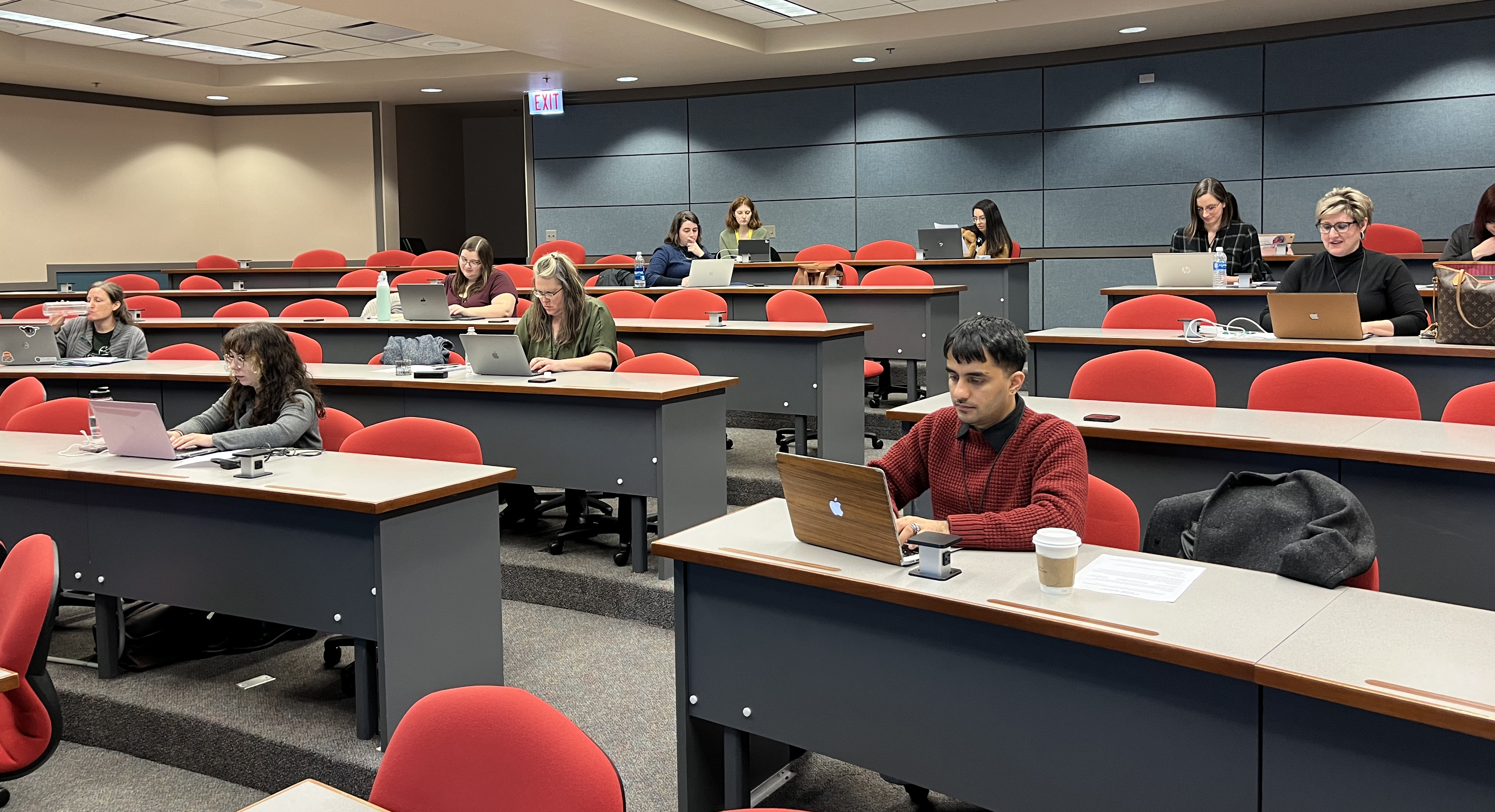
How tired are you?
- Very tired. We’ve been understaffed for a bit now, so while we’ve worked to slim down operations, there’s still a lot of extra work we’re taking on. I also have a baby who’s not sleeping through the night yet. So there’s that too.
- Leigh: Can someone please hold my phone up and type this for me?
- Angela: ^This.
- Saurabh: 2 out of 2.23
- Spring Break is in two weeks!
- So tired my boss tried to organize a reading group about burnout and we couldn’t do it.
- Not as tired as I was this time last year, thankfully!
- I fell asleep talking to my grandma on Valentine’s Day and I feel guilty.
- It’s February, and I’m dreaming of summer.
How are you advocating for equitable working conditions and supporting student workers?
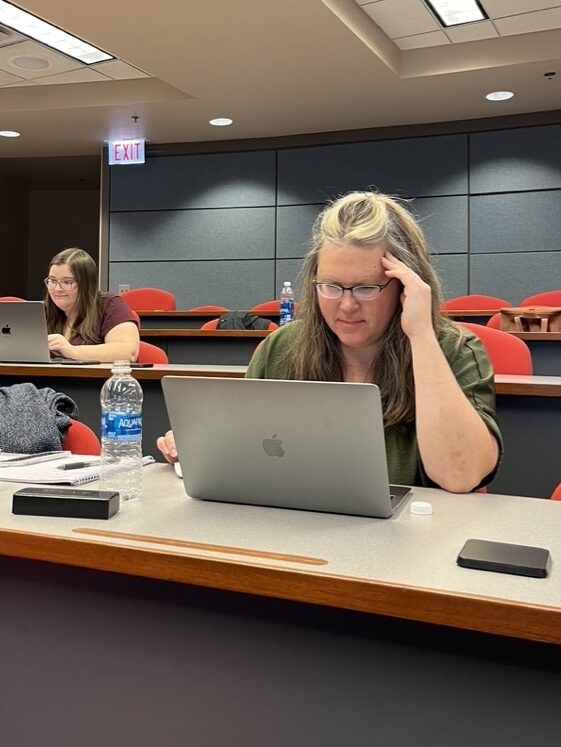
- I am currently collaborating with the subject tutoring program director to stay on top of HR policies around student workers. We recently made sure that student wages would rise in increments over the next two years, but that’s still so much less than they deserve. We also have a lot of unofficial policies in the center, like paid sick leave and fellowships for undocumented students, which we can’t tell the admin about at all.
- I’m so all about this. For example, paying double time for shifts that no one wants on days like Saturday, adding hours when we cannot reimburse for an expense, etc. Letting students work more hours when they have the time, but adding those hours to weeks when they cannot work.
- Leigh: I pay my tutors the max amount my budget can support, well above other campus positions, and ask for forgiveness rather than permission to do so. This has in turn I think helped other units like the Math Center (on a different budget from the WC) make a case for paying their tutors more. In the early days of the pandemic, I also made the case for allowing my staff to work remotely when most other campus positions evaporated, which laid the groundwork for them to continue to be able to hold hybrid positions, even as undergraduates, which allows for flexibility in their working conditions. In those same early pandemic days, the university also tried to limit international students’ ability to work remotely, and I worked with International Student Services and Global Service to find pathways for international students to keep their jobs, which are also considered leadership positions, regardless of citizenship status. Also, this is tiny, but I signed a petition circulated by student workers calling for a minimum wage increase, and I’m not sure how many faculty even saw that petition (and they got it! Woohoo!). Oh, I also keep the Writing Center stocked with snacks and other life kit items, available to both writers and tutors, and have ordered some furniture and other supplies that make it a more flexible workspace.
- Sherry: Yes. When the admin created hoops—we pushed back. And, they had to concede that the existing university infrastructure—with many faculty teaching online for the first time and some asynchronously—meant that writers needed more support from sources that were already in the practice of providing hybrid interventions. And, some of my tutors logged in to help international students using non-Google platforms in the middle of the night.
- I pay in snacks (in addition to the low wages the university has locked undergraduate student workers into, as I continue to advocate for student raises). We have a budget for hospitality, so I make sure we have meals at meetings and get input from the student tutors on what products would be most appreciated (takeaways for another meal, for example) and honor dietary restrictions in a way students tell me are not necessarily honored in the campus cafeteria.
What’s one piece of advice you would give to a grad student who’s considering jobs in writing center work?
- I recommend making sure your philosophy of WC work is a match for the institution. I wouldn’t have predicted that one going into the experience. It can be easy to forget that not every institution is supportive of equity-oriented, student-focused writing center work, and you don’t want to find yourself in a position where you are asked to do things you disagree with/are not supported in your initiatives! A job is important, but there are lots of jobs (if you think creatively!)–you don’t want just any ol job even though the scarcity mindset in academia may make you think so: you want a job you can do and live well with!
- With the job market how it is now, getting your foot in the door is a huge challenge. You may be applying for a job where there are 60+ applicants. So, you’ll want to think about what your “brand” is for the job market – what are you bringing to a writing center that no one else is? Brand is a weird name for it, but basically, what’s your professional identity? Your job materials (CV, cover letter, teaching and/or admin statement) should reflect your interest in writing centers and your “brand.” Make it very clear to application reviewers that you care about this work, you’re engaged in the field, and that you have a needed and unique perspective that can benefit that new writing center. Tailor your materials for the type of job that you’re interested in by foregrounding the important and relevant bits.
What is a hope or dream that you have for your writing center in the next five years?
- Tabitha: I hope that we will have sorted out the purpose and operation of our writing workshops program and found some strong collaborators in our composition courses to help us put them through their paces. I also hope to continue developing our peer mentoring program, as well as try out a sequence for our developmental staff meetings.
- I would like to see more of the writing tutors we trained on the inside (in prison) come home with master’s degrees and teach undergraduate composition on our outside campus. (We have 40 trained tutors on the inside, 16 of whom have graduated with their MAs last June, and 1 who has come home and has been teaching undergraduate composition classes and working as our Assistant Director in the Writing Center for 1.5 years now.)
- Melissa: Our university has an embedded seminary that offers an MA in Restorative Justice Ministry, which has led to a collaboration between the university/seminary/department of corrections to support writers within and outside of the university setting.
- Saurabh: When tutoring is provided in more than one language and a blend of two or more languages.
- Leigh: I’d love to have an assistant or associate director to be able to develop more complex and advanced offerings and support students in new ways. The structure of my center makes it challenging, but I’d like to see more tutors engaged in research. And it’s never going to happen because of the structure of the center and because I’m already stretched so thin, but I desperately miss community work, which I love and think my tutors would also love; I wish there were more pathways for them to get to explore that. Also, honestly, I am so burnt out that I desperately would like to rotate out for a bit. There. I said it. I used to strongly believe all writing center directors should have permanent roles – for consistency in leadership, for disciplinary expertise, for campus partnership sustainability. That’s probably true for a lot of campuses. But as the faculty director, I’m the only non-undergraduate student in my writing center, which is not only tiring, it’s also extremely isolating, as great as my tutors are. A peer (i.e. faculty or professional staff) team member or collaborator would help (and reconnecting with colleagues at conferences really really helps!!!) , but so would having the chance to step away and re-center and re-energize.
- Rachel: Thank you for writing this. It’s huge and we don’t say it enough. These positions aren’t a luxury; they keep everyone present, healthy, and able to sustain themselves in this work.
- Sherry: Yes, Leigh, we hear you. Perhaps we could create an exchange program. Kind of like a Fulbright, where those of us with additional staff could make short-term exchanges. You could come to our centers to conduct research and get replenished, while we served yours.
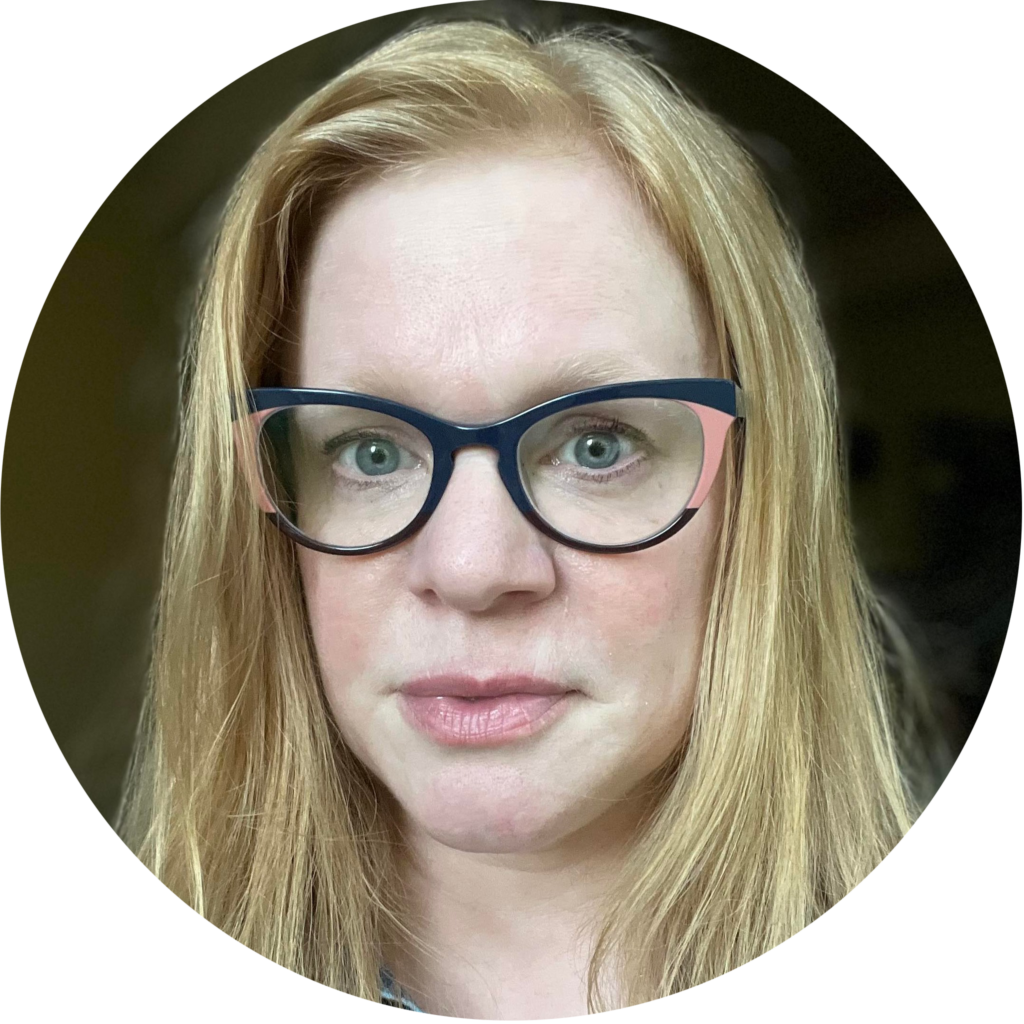
Jennifer Conrad is teaching faculty in the Writing Center at the University of Wisconsin–Madison. Her research interests include composition pedagogy, writing center studies, 20th-century and contemporary literature and visual art, animal studies, medical humanities, and creative writing. Her newest poetry collection is A World in Which (Terrapin Books, 2024).
Ellen Cecil-Lemkin is a teaching faculty for the Writing Center at the University of Wisconsin-Madison. Her research explores ways to create more accessible environments, especially in writing centers.
